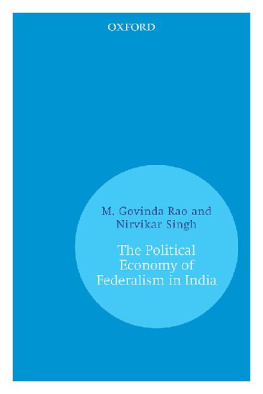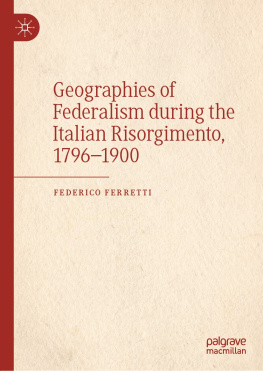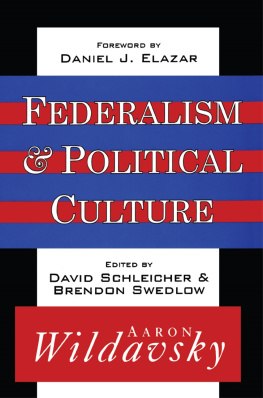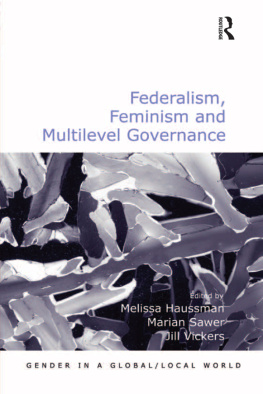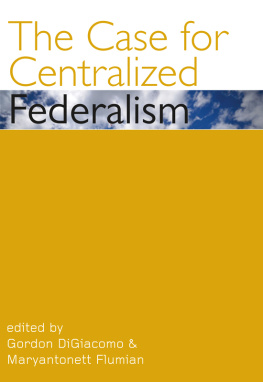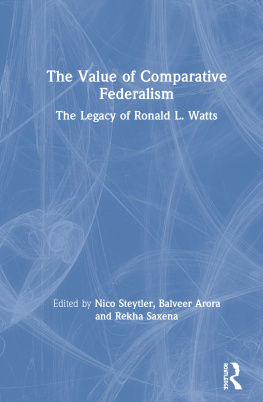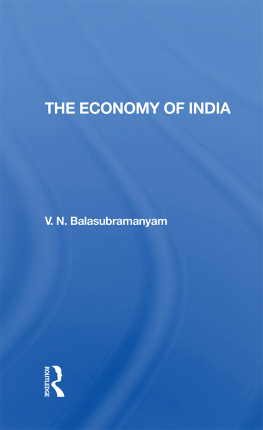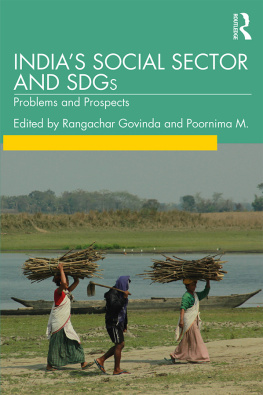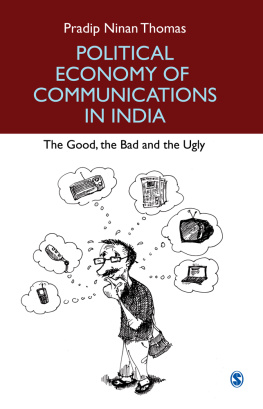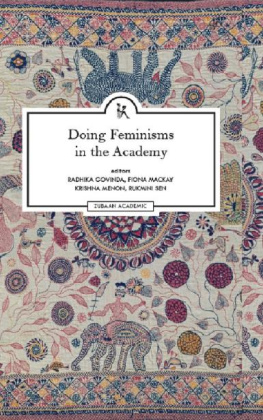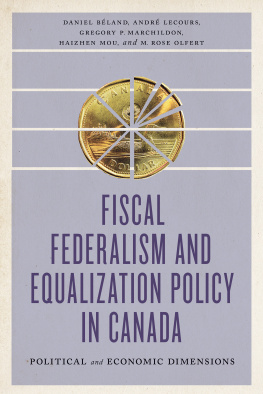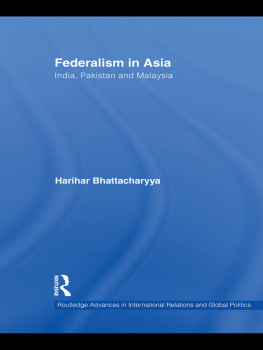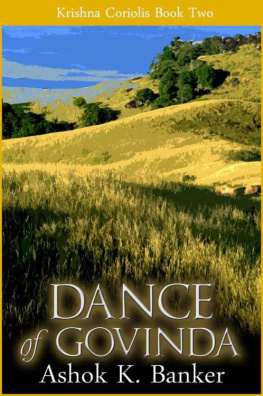Political Economy of Federalism in India
Indian Federalism is at a crossroad. On one hand, the legacy of colonialism, partition, and the vision of nation-building all contrived to create a centralized federation. On the other hand, the ongoing transition to a free market has brought the contradictions of centralized federal arrangements to the fore.
This book incorporates economic perspectives on political institutions, more comprehensively than ever attempted before and is divided into three parts
Historical review of the Indian Federal System
Economics of Indian Federalism
Political Economy and Intergovernmental reforms
It further emphasizes the emergence of coalition governments at the Centre, and the increasing importance of regional parties which have brought out the contradictions in the efficient governance of the federation.
To Devaki, Sunil, and Sneha for their constant love
and support and for the time and things they missed
M. Govinda Rao
To my parents, and to Inderjit, Bhairav, and Keshav
for their constant love and support
Nirvikar Singh
The Political Economy of
Federalism in India
M. G OVINDA R AO
AND
N IRVIKAR S INGH

Oxford University Press is a department of the University of Oxford.
It furthers the Universitys objective of excellence in research, scholarship,
and education by publishing worldwide. Oxford is a registered trademark of
Oxford University Press in the UK and in certain other countries
Published in India by
Oxford University Press
YMCA Library Building, 1 Jai Singh Road, New Delhi 110001, India
Oxford University Press 2005
The moral rights of the author have been asserted
First published 2005
Oxford India Paperbacks 2006
Third impression 2011
All rights reserved. No part of this publication may be reproduced, stored in
a retrieval system, or transmitted, in any form or by any means, without the
prior permission in writing of Oxford University Press, or as expressly permitted
by law, by licence or under terms agreed with the appropriate reprographics
rights organization. Enquiries concerning reproduction outside the scope of the
above should be sent to the Rights Department, Oxford University Press, at the
address above
You must not circulate this work in any other form
and you must impose this same condition on any acquirer
ePub ISBN-13: 978-0-19-908785-3
ePub ISBN-10: 0-19-908785-7
Printed in India by Rajshri Photolithographers, Delhi 110 032

Contents
Political Economy of Federalism: Challenges
of Reforming Policies and Institutions
Indian federalism is at a crossroad. On the one hand, the idea of India is still contested. The legacy of colonialism, partition, and the vision of nation building all contrived to create a centralized federation, which still exercise a strong influence. Centralized planning as the development strategy adopted soon after independence, required further concentration of economic powers. On the other, the recent transition to market-based development and the accompanying opening up of the economy have brought the contradictions of centralized federal arrangements to the fore. On the political front, the end to single-party rule at the Centre and states, the emergence of coalition governments at the Centre, and increasing importance of regional parties in the political affairs of the country have brought into focus various contentious issues in the efficient governance of the federation.
The challenges thrown up by market-based development in a globalizing environment require the various governmental units in Indian federalism to act in a manner that provides cost-effective physical and social infrastructure, creates the proper enabling environment for growth, and efficiently regulates, the market where necessary. This is a challenge for any single government, and the Central, state and even local governments in India must accomplish this with some degree of coordination. However, in practice, current institutional arrangements involve acute, often destabilizing, political and economic competition. For example, the emergence of regional parties in pivotal roles at the Centre, and the instabilities inherent in coalition politics as evident from frequent changes in political alliances and repeated elections have made achieving national interests more difficult. There are genuine concerns that some regions of the country are being permanently left behind.
The solution is not obvious. While the dominance of a single political party in the government at Central and state levels for over three decades provided stability, it did not allow mechanisms towards dispute resolution, or systems and institutions to create adequate checks and balances to adequately evolve. If anything, the dominant party itself decayed internally, as did some of the other institutions of government. Facing emerging challenges of accelerating the pace of development, particularly in regions lagging behind, requires a careful evaluation of Indias federal framework, including the various institutions of political and economic governance.
Many books written on Indian federalism look purely at economic issues of assignment, overlapping, and transfers. Even here the issues of Centre-state relations have been looked at in isolation from state-local relations. From the perspective of political science, most studies deal with party politics or with legal and constitutional issues, without looking at economic aspects. This book is an attempt at a synthesized framework, combining both elements in a political economy prism, more comprehensively than has been attempted before. Since we are both economists, any tilt is towards economic issues, but we have incorporated economic perspectives on political institutions as well. Ultimately, we believe, only such a framework can provide a useful guide to implementable reform of policies and institutions.
This book has evolved over nine years. Its genesis goes back to 1995 when the authors met at a conference in New Delhi, organized by Professor Mancur Olson under the aegis of the Institutional Reform and the Informal Sector (IRIS) project. What was originally envisaged as a small monograph has, over the years, expanded into a major project which has now come to fruition. During the course of these years, there has been a number of changes in intergovernmental fiscal arrangements and the political and economic situation in India. It has indeed been a challenge to work and rework on several chapters to keep up with the changes.
On many chapters, first drafts were written independently. We then exchanged and commented extensively on each others drafts, and rewrote them many times, taking full advantage of e-mail and word processing technologies that developed just in time for us to carry out a long-distance collaboration. Nirvikar Singh has been based at the University of California, Santa Cruz, throughout this period, but also worked on the project while a visitor at the Centre for Research in Economic Development and Policy Reform (CREDPR), Stanford University. Govinda Rao started work on the book while he was at the National Institute of Public Finance and Policy (NIPFP) in 1995, and completed it in 2004, back in the same institution after working on it in several other institutions. The major portion of the work was carried out in Australia South Asia Research Centre (ASARC), Research School of Pacific and Asian Studies, the Australian National University, and the Institute for Social and Economic Change (ISEC), Bangalore. The work was greatly facilitated by visits of Govinda Rao to University of California, and Nirvikar Singh to ASARC, NIPFP, and ISEC at various times during this period. We even managed to find time to discuss our project in the midst of conferences in Cornell, Stanford, Bangalore, and Chennai. We are particularly grateful to our host institutions, which provided all the facilities and environment for carrying out these studies.





